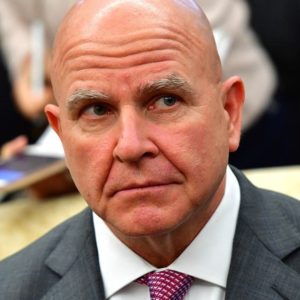Debating U.S.-China Strategic Competition
Explore contemporary views on U.S.-China strategic competition alongside a variety of prominent instructors.
Summer 2010
Washington, DC
This seminar offers students an introduction to and interpretation of American “strategic culture,” that is, the habitual ways and purposes that influence when and how the United States uses its military power. Beginning with pre-Revolutionary British roots and charting the effects of the wars from independence in 1776 and 1812, the fulcrum of the course will be a day-long “staff ride” to Gettysburg, taking a role-play approach to understanding the causes, the conduct, and the consequences of the war that ensured America would be “whole and free.” Following an assessment of the post-World War II “world America made,” the course will conclude with a student-led exercise to formulate a strategy for the 21st century.
Image: Allyn Cox, The Monroe Doctrine, 1823, courtesy Architect of the Capitol
Thomas Donnelly on Challenges to U.S. Primacy

Gary J. Schmitt is a senior fellow in the Social, Cultural, and Constitutional Studies program at the American Enterprise Institute (AEI), where he studies issues related to the American presidency, the U.S. constitution and its principles, and American civic life.

Gary J. Schmitt is a senior fellow in the Social, Cultural, and Constitutional Studies program at the American Enterprise Institute (AEI), where he studies issues related to the American presidency, the U.S. constitution and its principles, and American civic life. Dr. Schmitt also writes on national security topics.
A former minority staff director of the US Senate Select Committee on Intelligence, Dr. Schmitt was executive director of the President’s Intelligence Advisory Board (then known as the President’s Foreign Intelligence Advisory Board). Before joining AEI, he was executive director of the Project for the New American Century.
Dr. Schmitt is the author, coauthor, editor, and coeditor of many books. In the area of civics and constitutional studies, his books include “McCulloch v. Maryland at 200: Debating John Marshall’s Jurisprudence” (AEI Press, 2020); “The Imperial Presidency and the Constitution” (Rowman & Littlefield, 2017); “Is Congress Broken? The Virtues and Defects of Partisanship and Gridlock” (Brookings Institution Press, 2017); “The Professions and Civic Life” (Lexington Books, 2016); and “Trendsetting Charter Schools: Raising the Bar for Civic Education” (Rowman & Littlefield, 2015).

Thomas Donnelly, a defense and security policy analyst, is the co-director of the Marilyn Ware Center for Security Studies at AEI. From 1995 to 1999, he was policy group director and a professional staff member for the House Committee on Armed Services.

Thomas Donnelly, a defense and security policy analyst, is the co-director of the Marilyn Ware Center for Security Studies at AEI.
He is the co-author with Frederick W. Kagan of Lessons for a Long War: How America Can Win on New Battlefields (2010). Among his recent books are Ground Truth: The Future of U.S. Land Power (2008), co-authored with Frederick W. Kagan; Of Men and Materiel: The Crisis in Military Resources (2007), co-edited with Gary J. Schmitt; The Military We Need (2005); and Operation Iraqi Freedom: A Strategic Assessment (2004).
From 1995 to 1999, he was policy group director and a professional staff member for the House Committee on Armed Services. Mr. Donnelly also served as a member of the U.S.-China Economic and Security Review Commission. He is a former editor of Armed Forces Journal, Army Times, and Defense News.
Readings:
Readings:
The seminar at Gettysburg National Battlefield will be conducted in the form of a “staff ride”—an interactive battlefield walking tour—which is a traditional pedagogical method among military commanders and their staffs, practiced today at each of the armed services’ War Colleges. Prior to the seminar, participants will be provided with reading materials on the Battle of Gettysburg and its strategic significance within the context of the American Civil War. They will also be assigned the role of a key commander or political figure to represent throughout the day. During the seminar, participants will be asked to justify, defend, and explain decisions that their “character” made in the course of battle. Creativity is encouraged, but critical thought and persuasive argument are essential.
The day-long seminar will conclude with a discussion on the essential strategic lessons to be derived from the Battle of Gettysburg. Participants will be encouraged to reprise elements of their roles from earlier in the day, but will also be expected to provide their own evaluation and analysis of the decisions taken by commanders and political leaders prior to and throughout the battle. The goal of this final session will be to determine the applicability of the lessons of Gettysburg—on the strategic and political level—to the conflicts of today.
Readings:
Discussion Questions:
Readings:

Daniel Blumenthal
Dan Blumenthal is a senior fellow at the American Enterprise Institute, where he focuses on East Asian security issues and Sino-American relations. Mr. Blumenthal has served in and advised the US government on China issues for more than a decade.

Christian Brose
Christian Brose is a Senior Fellow at the Carnegie Endowment for International Peace and the Head of Strategy at Anduril Industries, prior to which he served as staff director of the Senate Armed Services Committee. He was also responsible for leading the production, negotiation, and passage of four National Defense Authorization Acts, which set policy and authorized spending for all U.S. national defense activities.

Matthew Kroenig
Matthew Kroenig is a Professor in the Department of Government and the Edmund A. Walsh School of Foreign Service at Georgetown University. A 2019 study in Perspectives on Politics ranked him as one of the top 25 most-cited political scientists of his generation. He has served in several positions in the U.S. Department of Defense and the intelligence community in the Bush and Obama administrations.

H.R. McMaster
H. R. McMaster is the Fouad and Michelle Ajami Senior Fellow at the Hoover Institution, Stanford University. Previously, he served as the 26th assistant to the president for National Security Affairs and as a commissioned officer in the United States Army for 34 years before retiring as a Lieutenant General. He is author of Battlegrounds: The Fight to Defend the Free World.

Robert Kagan
Robert Kagan is a senior fellow with the Project on International Order and Strategy in the Foreign Policy program at the Brookings Institution. He is a contributing columnist at The Washington Post. His most recent book is The New York Times bestseller, The World America Made.

Vance Serchuk
Vance Serchuk is Executive Director of the KKR Global Institute and an Adjunct Senior Fellow at the Center for a New American Security. Prior to joining KKR, Mr. Serchuk served for six years as the senior national security advisor to Senator Joseph Lieberman (I-Connecticut).

Diana Schaub
Diana Schaub is a nonresident senior fellow at the American Enterprise Institute (AEI), where her work is focused on American political thought and history, particularly Abraham Lincoln, Frederick Douglass, African American political thought, Montesquieu, and the relevance of core American ideals to contemporary challenges and debates. Concurrently, she is Professor Emerita of Political Science at Loyola University Maryland, where she taught for almost three decades.

Richard M. Reinsch II
Richard M. Reinsch II is Editor-in-Chief and Director of Publications at AIER. He is coauthor, with the late Peter A. Lawler, of A Constitution in Full: The Unwritten Foundation of American Liberty.

Steven F. Hayward
Steven F. Hayward is a senior resident scholar at the Institute of Governmental Studies at UC Berkeley, Senior Fellow of the Claremont Institute, and a visiting lecturer at Boalt Hall Law School. Hayward is the author of a two-volume narrative history of Ronald Reagan and his effect on American political life, The Age of Reagan: The Fall of the Old Liberal Order, 1964-1980, and The Age of Reagan: The Conservative Counter-Revolution, 1980-1989.

William Kristol
William Kristol is editor at large of The Weekly Standard, which, together with Fred Barnes and John Podhoretz, he founded in 1995. Mr. Kristol has served as chief of staff to the Vice President of the United States and to the Secretary of Education. Before coming to Washington in 1985, Kristol taught politics at the University of Pennsylvania and Harvard’s Kennedy School of Government.